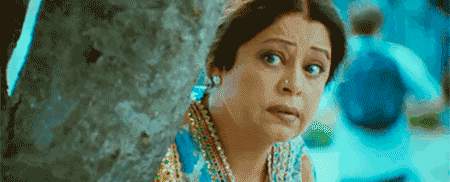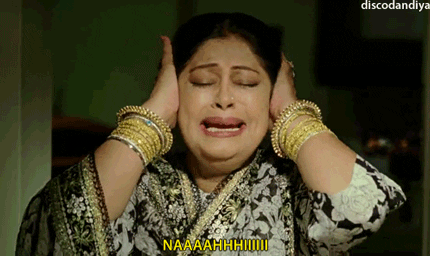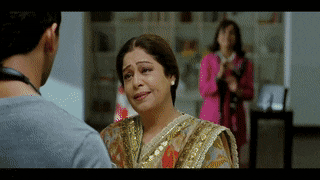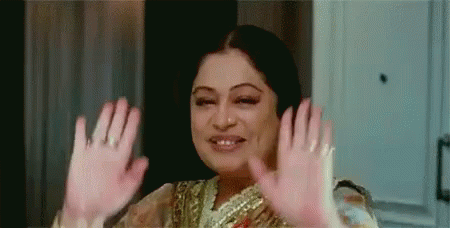Trigger warning: Divorce, Domestic Abuse
Hello ji,
I attended a close friend's family wedding a few years back. At the wedding, I went to greet his family elders. I did not expect the conversation to go beyond pleasantries but found myself at the epicenter of a full-on family gossip session.
The headline: "Haai, did you know the bride's sister is a divorcée?"
The conversation largely oscillated between thoughtful speculation about the cause of the divorce - "She is so dark. Her husband must have found a prettier girl." - to pontificating over the large-heartedness-slash-foolishness of the groom's family to sign the dotted line with "such a family".
According to the Federation of Indian Uncle-Dudes and Aunty-Ladies, if a woman has had a divorce, she must be characterless, or conceited, or infertile, or all of the above and so, we must keep our sons away from her and her third cousins.
If a man is divorced, however, his wife must have been all of these too, and what a pity the poor sod fell into her evil clutches so let's all marry our daughters to him pronto while his dowry rate is still down.
This week, I set about talking to some such “tainted” women and their families to find out why they are so hell-bent on wrecking the Great Indian Family Value Ball with this pesky business of resisting physical, mental, emotional, and financial abuse.
The Marriage Rule Book
Seeta's mom was disturbed. She could not deal with Seeta having male friends, going out at night, and generally not being as 'ladylike’ as she ought to be. She decided that Seeta needed to get married. Now.
"I was told that this was the last thing she wanted me to do. It was my last chance to get her validation. A part of me also wanted to escape my suffocating home for the promise of a better life where I could take my own decisions."
After seeing a few prospective grooms, the family settled on one.
"Looking back, the relationship was destined to fail. Our communication as a couple was zero. My husband and in-laws expected me to make all the sacrifices, and when I asked why, the standard answer would be 'This is how a marriage is'. There was apparently a Marriage Rule Book that everyone but me had read."
If indeed there was a Marriage Rule Book, Seeta was flouting all the rules in it.
"According to my husband and in-laws, there were three functions a wife must perform - doing household chores, bringing in her income, and having sex with the husband. One, I do not enjoy doing household chores (my ex-husband did not either, but he is a man, so that was never questioned). Two, I was earning more than my husband and refused to place all my salary in his hands to do as he pleased with it. Three, as our relationship soured, I naturally stopped feeling like having sex with him. I had failed to perform all the three functions they expected of me."
The straw that broke the camel's back came for Function #3.
"One day, my in-laws ordered me to have sex with my husband. I was shocked and scared that they would next order him to rape me and he would do it. I left the same day. It was the day of our first marriage anniversary."
The families agreed on a mutual divorce.
"My lawyer discouraged me to ask for any monetary compensation. She said that it will get dirty, and draw out the time taken. Before her, I had visited a male lawyer who asked me very intrusive questions about my sex life without giving any context about their importance to the case. Finally, he asked me his main two questions: 'Was there physical abuse? Was your husband having an affair?' Since my answer to both was ‘no’, he declared that I should not be getting a divorce at all, because my reasons were not valid according to him."
As she was going through the legal ordeal, Seeta’s parents - who had chosen the man she had married - refused to stand by her through it.
"My family treated me in a terrible way. They wanted to avoid a divorce at all costs. My own mother called me names, like 'used goods' or 'leaf which has been eaten out of' which is a slur in our language for a woman who is not a virgin. They suggested I have a child with the man to mend our already ruined relationship. They blamed me for being curt, defiant and generally not agreeable. They blamed me for leaving, and they also blamed me for not leaving sooner."
After the divorce, Seeta left her parents' home and is living by herself now.
"I barely talk to my parents anymore. Being able to walk out like this is, of course, a privilege. I was financially stable and had a great support system in my friends. Not every woman has these options.”
“I am no longer bound to my parents who never supported me in the first place. I do not interact with any relatives or attend family gatherings who only want to gossip about me anyway. I am no longer bound to my ex-husband who was an unfit partner in every way. I feel free and I am much happier with life.”
Seeta thinks that rising divorce rates are an indication of women living happier lives.
“The divorce rates actually need to rise a lot more because many more marriages like mine are a sham."
“Wear a mangalsutra so the Court doesn’t think you are chaalu”
When Jigyasa tried to walk out of her abusive marriage, her then-husband falsely alleged that she was unfaithful to him and had extra-marital affairs with multiple men.
"In my divorce petition, I quoted some instances of abuse I went through and attached proofs - WhatsApp chats in which he had either verbally abused me, or referred to the incidents of his physical abuse of me. His petition, in turn, made baseless allegations of my infidelity without any proof attached. In court, his lawyers began asking me to recount how many men I had slept with. I protested - how could they even ask me such questions when they did not have any proof whatsoever to support their allegations?"
Proof or no proof, given the nature of these allegations, Jigyasa's lawyer gave her a number of "tips" on how she must appear in Court.
“He told me I needed to wear simple Indian clothes, which covered my body from head to toe. My hair should be neatly tied, not left open. My shoes should be flats, not heels. I should speak only when spoken to. I should sound soft and not harsh. I should not show any negative emotions like anger or resentment, and I should definitely not ask any questions.”
There’s more.
“I should wear no makeup or jewelry but I should wear a mangalsutra (a necklace some married Hindu women wear as a symbol of their marital status). I needed it to appear like an adarsh bharatiya naari (a perfect Indian woman). Apparently, if you do not present as whatever these men thought adarsh bharatiya naaris look like, you deserve to be beaten by your partner.”
And so, Jigyasa went to court wearing the same mangalsutra which symbolized the abusive marriage that she was trying to escape.
The only thing she wanted from her husband was her grandmother's heirloom jewelry back.
"My grandmother had lovingly kept some ornaments aside for my wedding ever since I was born. It had a lot of sentimental value for me. But my lawyer flatly refused. He said, ‘If you ask for a single item, rest assured you will have to fight this case for three years, seeing your abuser day after day as he maligns your character in front of your parents and family’.”
“He said that when asked what I wanted, I should only say, 'I have suffered a lot in this marriage. I want nothing but my freedom back'. He said that if I make a single other demand, the Judge will see me as a chaalu aurat (a scheming woman) and I will have to suffer the consequences of it.”
This caricature of the woman who is 'in it for the money' has a very strong hold in the legal corridors.
“Women are seen as malicious for wanting their own stuff back. And so, every single piece of jewelry that I brought from my parents’ house after our wedding - down to every last item of clothing I owned - was kept by my ex-husband and his family. I got my freedom but lost everything else in the process."
The Great Indian Family Value Ball is being dropped by women
Reena, the wife of a divorce lawyer, concurs with Jigyasa's assessment of the legal profession.
"There is a rise in the number of divorce cases in India. My husband genuinely believes that this is because of the 'misplaced support' that women are getting from their families and society at large. The law might be pro-women, but lawyers aren’t.”
Reena’s husband and his colleagues lament the breakdown of the “Indian family structure”. Guess who they blame for it?
“They squarely lay the blame on women. In the internal conversations between lawyers - including the lawyers who are representing women clients - a woman who knows her mind and demands her rights is referred to as tez, chhuri, kamini, Jhansi ki Rani, and Nari Mukti Morcha."
Divorces save lives
Starting from California in 1969, many states in the US passed what is called the "Unilateral Divorce Law". This law allowed either spouse to terminate the marriage without the consent of the other. Such a divorce could be a "no-fault divorce" (neither party held responsible for the end of the marriage) or an "at-fault divorce" (blame assigned to one party, such as adultery or abuse).
This was a landmark legislation that had a significant impact on the lives of American women. This paper by Professors from Harvard and Stanford studied this impact. Here is what they found:
"We find a large, statistically significant, and econometrically robust decline in the number of women committing suicide following the introduction of unilateral divorce. No significant effect is found for men… We find suggestive evidence that unilateral divorce led to a decline in females murdered by their partners, while the data revealed no discernible effects for men murdered."
But what about the children?
This is not just theory. Millions of lives could be saved if divorces were made legally and socially more accessible to women.
I spoke to Kanika, whose mother divorced her father in the 1980s because of his inability to stand up to his family's emotional abuse.
"Mom was married into a joint family. Her mother-in-law and sister-in-law treated her like an outsider from Day 1. They would take her belongings and divide them among family members without asking her. My daadi (paternal grandmother) was controlling to the extent that she did not even allow my parents to go on their honeymoon. She would not as much as let them take a walk together. Mom worked in a PSU and earned a good salary. All her salary was taken by the family and spent on family expenses, while my Dad was allowed to put his salary into investments to secure his future."
Kanika's mother - a woman clearly ahead of her years - decided to leave as soon as she found out that she was pregnant, and her mother-in-law forbade her to save even for her child.
"During the divorce process, my father's lawyer made many false allegations, including questioning my mother's character. But my mother persevered and finally, the divorce came through. There was no alimony, but child support was fixed at Rs 300. The court did not adjust it for inflation, which meant that my mother was getting Rs 300 a month till the mid-2000s when I turned 18. By then, I was in college and this amount would not even cover my canteen expenses. My mother single-handedly paid for my entire education, my entire upbringing."
This is not to say that Kanika and her mother were spared the social stigma that every divorced woman in India has to contend with.
"Kids would be told by their parents not to play with me. When I grew up, people did not want to marry their sons to me. I married into a very progressive family, but even today, my in-laws are never upfront to outsiders about my mother's marriage. For my mom, this is an everyday reality. If she has even a minor difference with anyone, pat comes the comment, 'No wonder your husband left you!'"
Kanika's father remarried but his second marriage did not work out either.
"After that, when I was about 10, he had a change of heart and decided he wanted a relationship with me. My mom never stopped me from meeting him, but never took any favour from him either. She gave me a very normal childhood - school trips, birthday parties, a home computer, coaching classes, everything.”
“I went on to graduate from an IIM, and it was my mother’s victory as much as mine. I don't think I would have had any of this if my mom had not had the courage to walk away from her marriage.”
People often stay in bad marriages "for the children". But are children better off growing up with one happy parent, or two unhappy ones? I asked Kanika her thoughts on this. Here is what she said:
"Who is a hero? A hero is someone who changes lives of others for the better. For me, my Mom is my hero. She took a step in the 1980s which many women are afraid to take even today. She is a fighter. I owe my entire life to her."
Mahima
This newsletter comes to you free of cost. But that does not mean that it costs nothing.
If you like the work I am doing with it, show me your love by buying me a coffee.
You can find Womaning in India on Instagram, Facebook, Twitter, LinkedIn, and Clubhouse.










"Seeta thinks that rising divorce rates are an indication of women living happier lives."
Agree so much!
As a man who is entitled to everything and responsible for nothing - I demand one post that has a lawyer’s perspective.
The divorce law, if I am not wrong (how can I be wrong? I AM A MAN!), says that there shouldn’t be Physical relationship for at least 6 months preceding the application. What la load of crap!
#MahaMahima, Thank you for what you are doing.